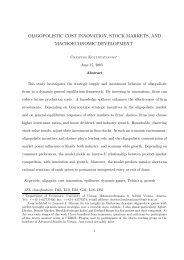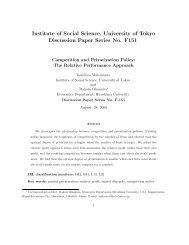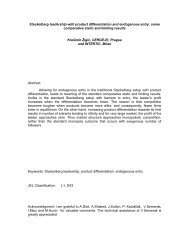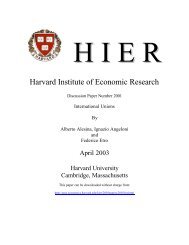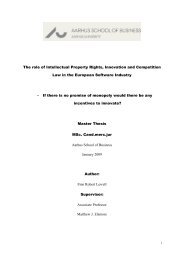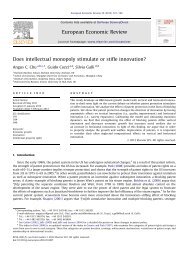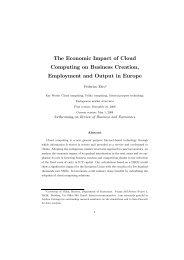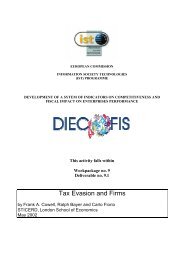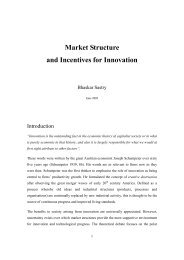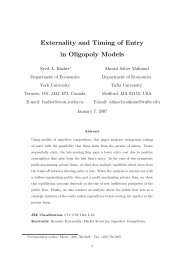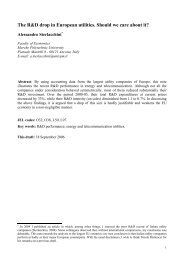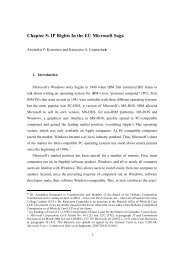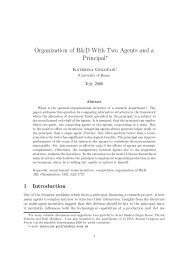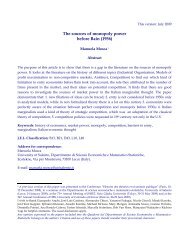The EU Approach to Abuse of Dominance - Intertic
The EU Approach to Abuse of Dominance - Intertic
The EU Approach to Abuse of Dominance - Intertic
Create successful ePaper yourself
Turn your PDF publications into a flip-book with our unique Google optimized e-Paper software.
82,’” July 2005) correctly emphasizes the need <strong>of</strong> solid theoretical and empirical foundations in the<br />
antitrust procedure: “a natural process would consist <strong>of</strong> asking the competition authority <strong>to</strong> first<br />
identify a consistent s<strong>to</strong>ry <strong>of</strong> competitive harm, identifying the economic theory or theories on which<br />
the s<strong>to</strong>ry is based, as well as the facts which support the theory as opposed <strong>to</strong> competing theories.<br />
Next, the firm should have the opportunity <strong>to</strong> present its defense, presumably <strong>to</strong> provide a counters<strong>to</strong>ry<br />
indicating that the practice in question is not anticompetitive, but is in fact a legitimate, perhaps<br />
even pro-competitive business practice.”<br />
Conduct that generates efficiencies should not, in our view, be deemed abusive unless it is<br />
demonstrated that the impact <strong>of</strong> this conduct on competition will result in consumer harm outweighing<br />
these efficiencies. While the Discussion Paper acknowledges that promoting efficiency is one <strong>of</strong> the<br />
primary objectives <strong>of</strong> Article 82, the framework for analysis itself actually provides relatively limited<br />
scope for taking efficiencies in<strong>to</strong> account. This manifests itself in a variety <strong>of</strong> ways:<br />
First, the Discussion Paper indicates that, consistent with existing practice, it will fall on<br />
dominant firms <strong>to</strong> prove the extent <strong>to</strong> which their conduct was justified on grounds <strong>of</strong> efficiency (# 77,<br />
79). Bringing efficiencies in<strong>to</strong> the analysis only as an affirmative defense will send the wrong signal <strong>to</strong><br />
the business community: it means that investigations will <strong>of</strong>ten have moved quite far along before<br />
efficiency considerations fully come in<strong>to</strong> play. Placing the burden <strong>of</strong> pro<strong>of</strong> on competition authorities,<br />
by contrast, makes more sense as they are likely <strong>to</strong> be in a better position <strong>to</strong> obtain relevant evidence<br />
from the dominant firm as well as other market participants (such as consumer organizations) on<br />
whether challenged conduct promotes efficiency—and have the expertise and resources <strong>to</strong> undertake<br />
such an inquiry. Accordingly, we believe it is for the authority investigating an alleged infringement <strong>of</strong><br />
Article 82 <strong>to</strong> support any finding <strong>of</strong> abuse by evidence that the conduct at issue is not justified by<br />
efficiencies, in particular in those instances where the dominant company proposes a prima facie<br />
efficiency justification.<br />
Second, according <strong>to</strong> the Discussion Paper, <strong>to</strong> assert a successful efficiency defense under the<br />
proposed analytic framework, dominant firms will be required <strong>to</strong> show that their conduct was<br />
“indispensable” in order <strong>to</strong> achieve the resulting efficiencies and that “competition in respect <strong>of</strong> a<br />
substantial portion <strong>of</strong> the products concerned [was] not eliminated” (# 84). To meet the first <strong>of</strong> these<br />
conditions, the defendant must “demonstrate that there are no other economically practicable and less<br />
anticompetitive alternatives <strong>to</strong> achieve the claimed efficiencies” (# 86). This condition means that<br />
liability could be imposed even on conduct whose efficiency and consumer benefits far outweigh its<br />
adverse effect on competi<strong>to</strong>rs simply because there exists an alternative that would have disadvantaged<br />
rivals less. In our view, this rule has no economic justification: at most, it will merely provide an excuse<br />
for rivals <strong>to</strong> second-guess the business decisions <strong>of</strong> their dominant competi<strong>to</strong>rs. <strong>The</strong> latter condition<br />
implies that efficiency claims by dominant firms, particularly those with high market shares, will<br />
9



